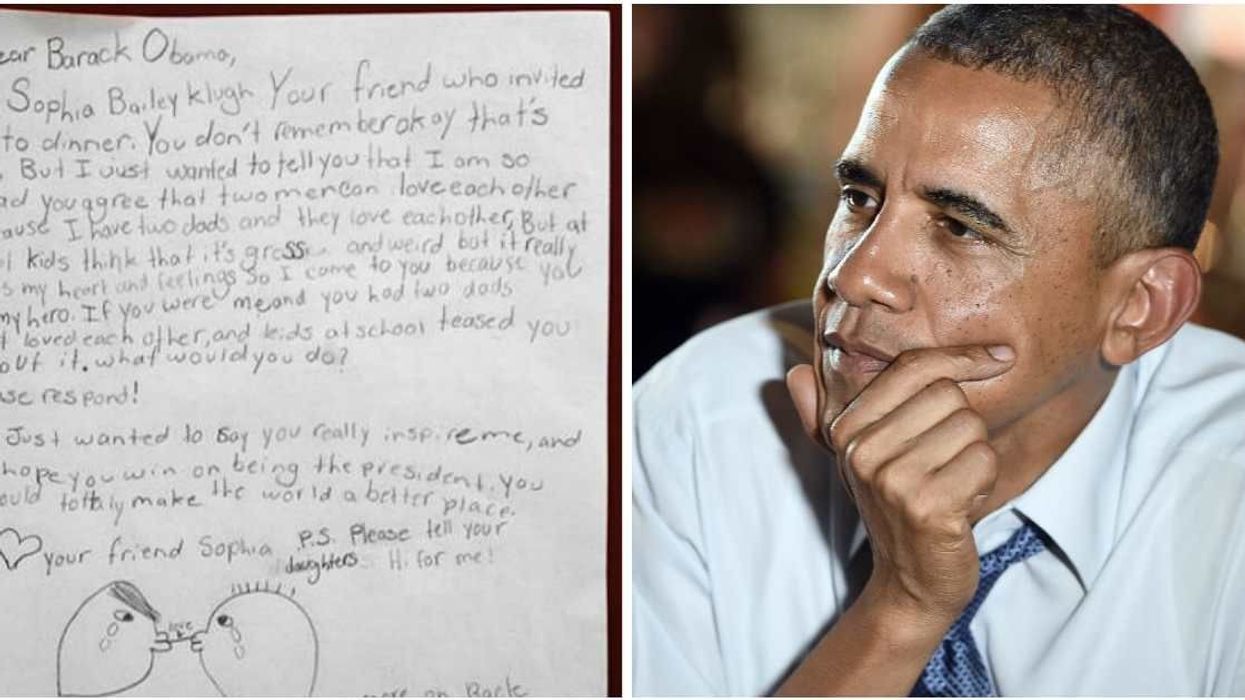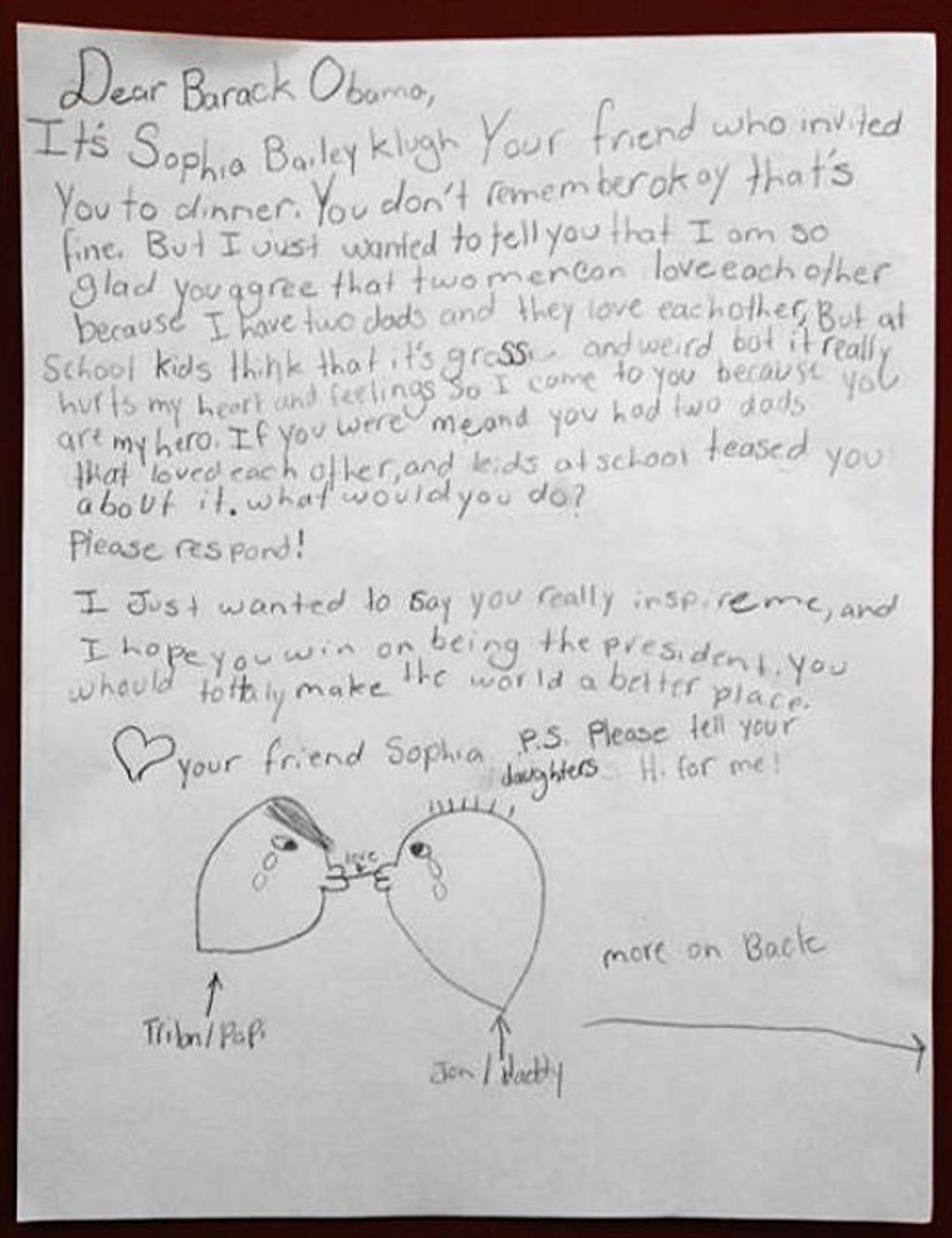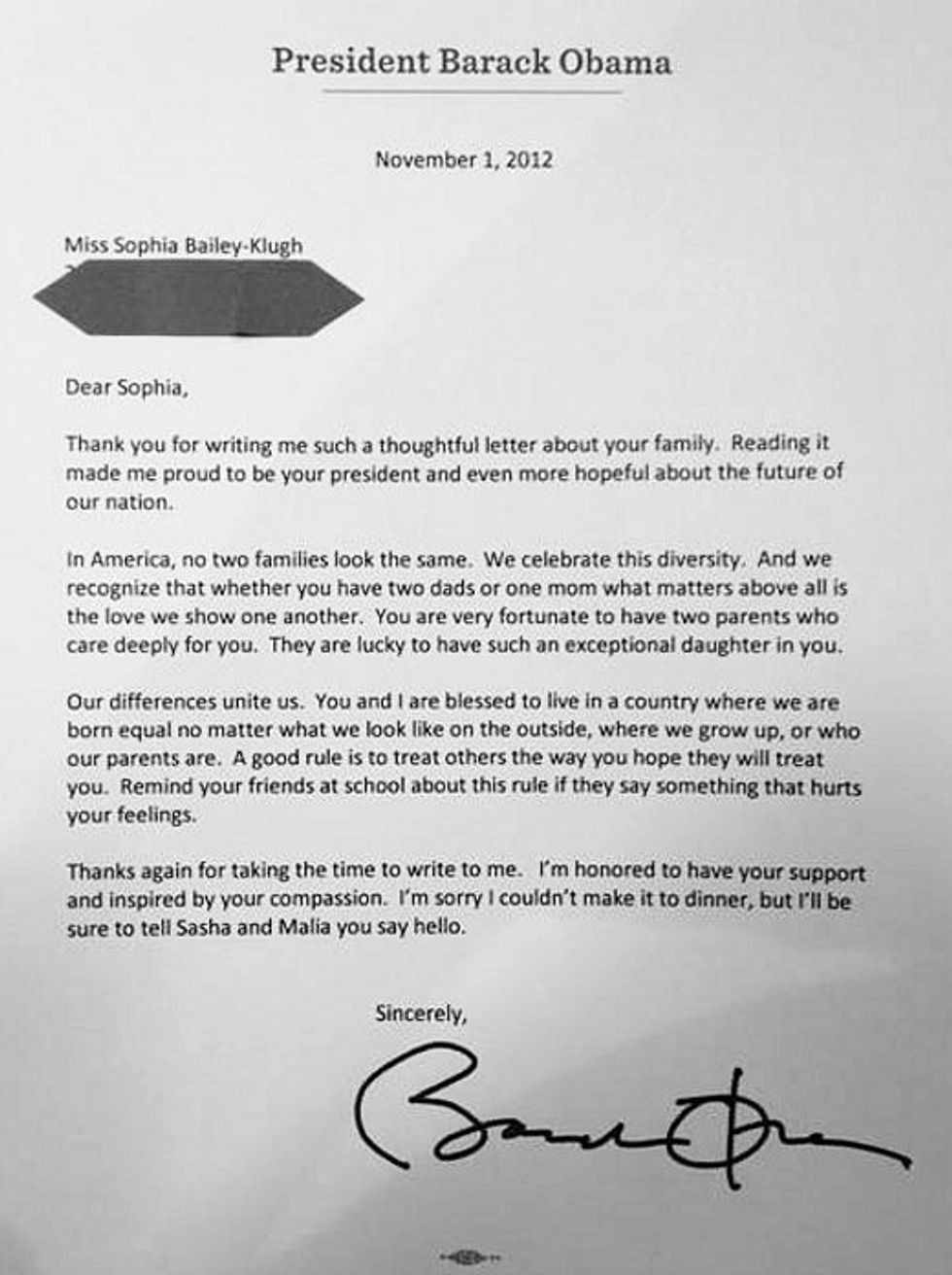Back in 2015, the Supreme Court’s decision to support marriage equality changed America for the better. In the realm of politics, it effectively put “the marriage debate” to rest. And the vast majority of America has followed suit, with polls showing ever-growing majority support for marriage equality.
However, that doesn’t mean the fight for true LGBTQ equality is over. A case in point came in 2012 when then-10-year-old Sophia Bailey-Klugh wrote a letter to President Obama thanking him for coming out in support of marriage equality during the presidential election but also expressing concern over how her classmates were responding to her two fathers:
Dear Barack Obama,
It's Sophia Bailey Klugh. Your friend who invited you to dinner. You don't remember okay that's fine. But I just wanted to tell you that I am so glad you agree that two men can love each other because I have two dads and they love each other. But at school kids think that it's gross and weird but it really hurts my heart and feelings. So I come to you because you are my hero. If you were me and you had two dads that loved each other, and kids at school teased you about it, what would you do?
Please respond!
I just wanted to say you really inspire me, and I hope you win on being the president. You would totally make the world a better place.
Your friend Sophia
P.S. Please tell your daughters Hi for me!
Not only did President Obama respond, but he also addressed all of Bailey-Klugh’s requests. And yes, that includes saying “hello” to his daughters for her. The letter is a master class in dignity and compassion. Like the best of all presidential letters, Obama also uses it as a teaching moment, knowing on some level that the letter will likely circulate far and wide beyond the eyes of one 10-year-old child:
President Barack Obama
November 1, 2012
Miss Sophia Bailey-Klugh
Dear Sophia,
Thank you for writing me such a thoughtful letter about your family. Reading it made me proud to be your president and even more hopeful about the future of our nation.
In America, no two families look the same. We celebrate this diversity. And we recognize that whether you have two dads or one mom what matters above all is the love we show one another. You are very fortunate to have two parents who care deeply for you. They are lucky to have such an exceptional daughter in you.
Our differences unite us. You and I are blessed to live in a country where we are born equal no matter what we look like on the outside, where we grow up, or who our parents are. A good rule is to treat others the way you hope they will treat you. Remind your friends at school about this rule if they say something that hurts your feelings.
Thanks again for taking the time to write to me. I'm honored to have your support and inspired by your compassion. I'm sorry I couldn't make it to dinner, but I'll be sure to tell Sasha and Malia you say hello.
Sincerely,
(Signed, 'Barack Obama')
This article originally appeared five years ago
More on Good.is
Mom defends her tough-love open letter to teenage son - GOOD



















 Revenge can feel easier than forgiveness, which often brings sadness or anxiety.
Revenge can feel easier than forgiveness, which often brings sadness or anxiety. 
 In the past two years, two malaria vaccines have become available for babies starting at 5 months of age.
In the past two years, two malaria vaccines have become available for babies starting at 5 months of age. By exploiting vulnerabilities in the malaria parasite’s defense system, researchers hope to develop a treatment that blocks the parasite from entering cells.
By exploiting vulnerabilities in the malaria parasite’s defense system, researchers hope to develop a treatment that blocks the parasite from entering cells. Created with
Created with 

 Volunteers who drive homeless people to shelters talk with a person from Ukraine in Berlin on Jan. 7, 2026.
Volunteers who drive homeless people to shelters talk with a person from Ukraine in Berlin on Jan. 7, 2026.
 Tasks that stretch your brain just beyond its comfort zone, such as knitting and crocheting, can improve cognitive abilities over your lifespan – and doing them in a group setting brings an additional bonus for overall health.
Tasks that stretch your brain just beyond its comfort zone, such as knitting and crocheting, can improve cognitive abilities over your lifespan – and doing them in a group setting brings an additional bonus for overall health. Overdoing any task, whether it be weight training or sitting at the computer for too long, can overtax the muscles as well as the brain.
Overdoing any task, whether it be weight training or sitting at the computer for too long, can overtax the muscles as well as the brain.

 Amoxicillin is a commonly prescribed broad-spectrum antibiotic.
Amoxicillin is a commonly prescribed broad-spectrum antibiotic.  Chart: The Conversation, CC-BY-ND
Chart: The Conversation, CC-BY-ND
 Counterintuitively, social media can make you feel more bored and lonely.
Counterintuitively, social media can make you feel more bored and lonely. Talking about what you’ve read can add a social dimension to what can be a solitary activity.
Talking about what you’ve read can add a social dimension to what can be a solitary activity.